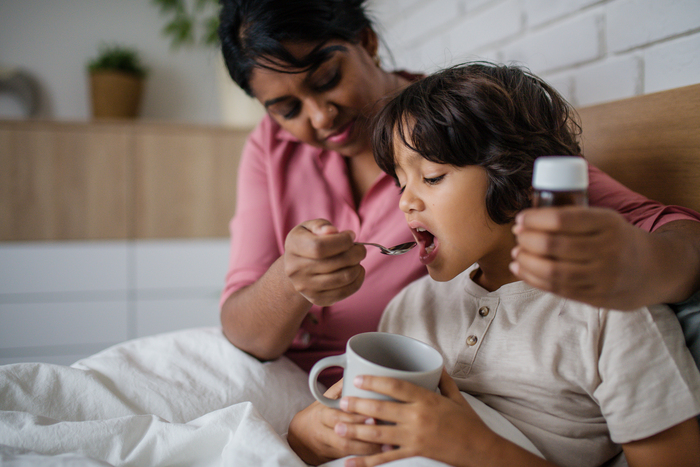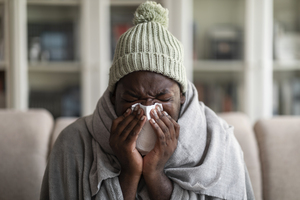Key points
- Colds and coughs in kids are often caused by viruses and can be treated at home without antibiotics or doctor visits.
- Over-the-counter cold medicines can have serious side effects in children under 4, instead, focus on comfort with warm fluids and rest.
- Home remedies for coughs and colds include honey, warm liquids, humidifiers, saline nasal spray, and keeping the child well-hydrated.
- If symptoms persist or worsen, or if the child shows signs of dehydration or breathing problems, seek medical attention immediately.

Colds and coughs are incredibly common in kids, especially during the colder months or after they’ve been around other children at school or daycare. The good news? Most of the time, your child doesn’t need to see a doctor or take antibiotics, according to HealthyChildren.org. In fact, many colds are caused by viruses that just need time (and a little TLC) to run their course.
As a parent, it can be tough to see your child uncomfortable, but there are plenty of simple, soothing home remedies that can make a big difference. From staying hydrated to easing a sore throat with warm fluids, small steps at home can go a long way in helping your little one feel better while their body fights off the infection.
Why over-the-counter meds aren’t always the answer
It’s tempting to reach for a bottle of cough syrup when your child is sick, but over-the-counter cold medicines aren’t always the best choice, especially for younger kids. In fact, the FDA advises against using most cough and cold medications in children under 4 years old because they haven’t been proven effective and can come with serious side effects. Some ingredients can make kids drowsy or hyper, raise their heart rate, or even lead to accidental overdose if doses get mixed up.
Instead of trying to “cure” the cold with meds, it’s often safer and more helpful to focus on keeping your child comfortable, like using a saline spray for a stuffy nose, giving them warm fluids, and making sure they get plenty of rest. These gentle, supportive care steps are usually all your child needs while their immune system does the heavy lifting.
Home remedies for soothing a child’s cough
When your child has a nagging cough, there are several gentle home remedies that can help them feel better without needing medicine:
- For kids over 1 year old (important warning), a little honey, just half to one teaspoon before bed, can go a long way in coating the throat and calming irritation.
- Warm liquids like herbal teas, broth, or warm water with lemon can also soothe the throat and help break up mucus.
- If your home feels dry, running a cool mist humidifier or letting your child sit in a steamy bathroom can make breathing easier by adding moisture to the air.
- If a stuffy nose is part of the problem, a saline nasal spray combined with a gentle suction bulb can help clear those tiny nasal passages, especially helpful for babies and toddlers who can’t blow their noses yet.
Home remedies for congestion and a runny nose
When your child has a runny nose or feels all stuffed up, there are several safe and soothing things you can do at home to ease their congestion:
- Nasal irrigation with saline spray and a bulb syringe or nasal aspirator can help flush out mucus and clear up their breathing, especially in little ones who can’t blow their nose yet.
- At bedtime, try gently propping up their head with a wedge or a pillow under the mattress. This can help mucus drain better and make sleep more comfortable (just avoid using pillows in the crib for infants).
- Keeping your child well-hydrated is also key; offer water, diluted juice, or an electrolyte drink to keep those nasal passages moist and mucus flowing.
- For children over 2, a gentle chest rub made with menthol-free, kid-safe ingredients can provide calming relief before bed.
The best ways to ease a sore throat at home
A sore throat can make even simple things like eating and talking feel like a challenge, but there are some easy ways to help your child feel more comfortable:
- Popsicles or cold drinks can numb the throat a bit and also help keep them hydrated, which is especially important when they’re not feeling their best.
- If they’re not in the mood for a full meal, try offering soft, easy-to-swallow foods like applesauce or yogurt that won’t irritate their throat.
- You can also try placing a warm compress or heating pad (on a low setting) around their neck for a few minutes to help reduce inflammation and ease pain.
Ways to support your child’s immune system if they’re fighting a cold
When your child is sick, one of the best things you can do is support their body’s natural ability to fight off the cold. That starts with making sure they get plenty of rest, quiet time, naps, and early bedtimes, which help their immune system do its job.
Nutritious foods rich in vitamin C and zinc, such as oranges, strawberries, eggs, or whole grains, can also give the body a boost while recovering. Try limiting screen time, especially before bed, since the light and stimulation can interfere with sleep.
To keep other kids safe and give your child time to fully heal, it’s important to keep them home from school or daycare until they’ve been fever-free for at least 24 hours without the help of medicine. These routines won’t instantly cure a cold, but they help create the best conditions for your child to bounce back faster.
When to go to urgent care for your child’s cold
While most childhood colds get better on their own, there are times when it’s important to check in with a doctor or visit urgent care:
- If your baby is under 3 months old and has a fever over 100.4°F, call your pediatrician right away; that’s always something to take seriously.
- You should also reach out if your child has a cough that lasts more than 10 days or if they’re showing signs of an ear infection, such as tugging at their ears, increased fussiness, or trouble sleeping.
- Breathing problems are another red flag; wheezing, chest pain, or struggling to catch their breath means it’s time to get help quickly.
- Additionally, you should never ignore signs of dehydration, like a dry mouth, no tears when crying, or fewer wet diapers than usual.
Ultimately, trust your gut. If something doesn’t seem right, it’s always better to get your child checked out for peace of mind.
Not sure if it’s just a cold? Book a visit with pediatric urgent care
If your child’s symptoms aren’t improving or something just doesn’t feel right, it’s always better to be safe. Use Solv to quickly find a trusted, kid-friendly urgent care center near you and receive same-day care from providers who specialize in children’s health.
FAQs
What are some home remedies for children's coughs and colds?
Some home remedies include giving children over 1 year old a little honey before bed, offering warm fluids like herbal teas, using a cool mist humidifier, and using a saline nasal spray for a stuffy nose. For congestion, nasal irrigation with saline spray, propping up their head at bedtime, and keeping them well-hydrated can help. A warm compress or heating pad can help soothe a sore throat.
Why are over-the-counter cold medicines not always the best choice for children?
Over-the-counter cold medicines can have serious side effects, especially in children under 4 years old. They can make kids drowsy or hyper, raise their heart rate, or even lead to accidental overdose. The FDA advises against their use in young children as they haven't been proven effective.
How can I support my child's immune system when they're fighting a cold?
Ensuring they get plenty of rest and sleep, feeding them nutritious foods rich in vitamin C and zinc, and limiting their screen time can support their immune system. It's also important to keep them home from school or daycare until they've been fever-free for at least 24 hours without the help of medicine.
When should I take my child to urgent care for a cold?
You should take your child to urgent care if they have a fever over 100.4°F and they're under 3 months old, if their cough lasts more than 10 days, if they show signs of an ear infection, if they have breathing problems, or if they show signs of dehydration.
How can I soothe my child's sore throat at home?
Popsicles or cold drinks can numb the throat and help keep them hydrated. Offering soft, easy-to-swallow foods like applesauce or yogurt can also help. A warm compress or heating pad around their neck can reduce inflammation and ease pain.









